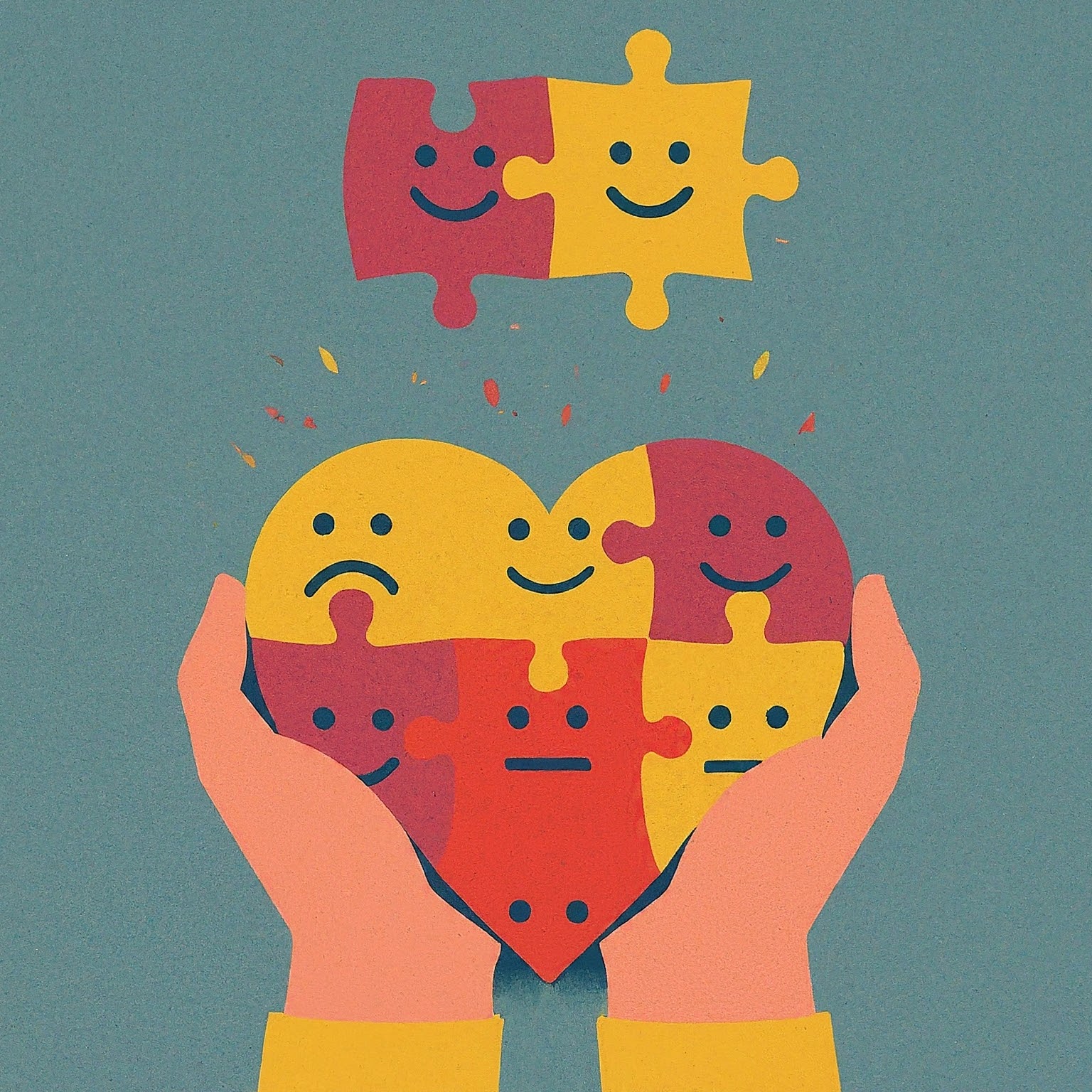As a teacher with over ten years in the classroom, I’ve witnessed the power of empathy in fostering positive social interactions and building strong friendships among students. Empathy is a fundamental skill that allows children to navigate the complexities of social situations, develop compassion, and become well-rounded individuals.
In this blog post, we’ll unpack the concept of empathy for kids. We’ll explore its definition, delve into why it’s important, and provide knowledge and tools to help you nurture this valuable skill in your child.
The superpower of empathy: Understanding others feelings
Imagine a superpower that lets you step into someone else’s shoes and see the world from their perspective. That’s the magic of empathy! It allows us to understand and even share the feelings of others, creating a deeper connection with the people around us.
There’re actually different types of empathy. Cognitive empathy is all about figuring out what someone might be thinking, while emotional empathy lets us feel what they’re feeling. Compassionate empathy takes things a step further, motivating us to take action and help someone in need.
Why empathy matters
Imagine a world where everyone could understand each other’s feelings. Pretty cool, right? Empathy is the key to building strong friendships, resolving conflicts peacefully, and creating a kinder world. When kids can see things from another’s perspective, they’re better equipped to communicate openly, build trust, and be supportive friends.
How does empathy develop in children?
Empathy is a skill that blossoms over time, just like a beautiful flower. Some children naturally lean towards empathy, while others need more guidance. There’re many factors that influence how empathy develops, like a child’s temperament and their social interactions.
Is there an empathy test for kids?
There’s no one-size-fits-all “empathy test” for children. However, by observing their behavior in social situations, you can get a good sense of their empathy development.
Empathy vs Sympathy: Understanding the difference
Walking in another person’s shoes vs Feeling sorry
Empathy and sympathy are often used interchangeably, but there’s a key distinction. Empathy is about stepping into someone else’s shoes and truly understanding their feelings. It’s like seeing the world through their eyes.
Sympathy, on the other hand, is about feeling sorry for someone. While both involve caring for others, empathy allows for a deeper connection and a stronger sense of understanding.
Example: A playground tumble
Imagine your child sees another kid trip and fall on the playground. An empathetic response might be, “Hey, are you okay? That looked like it hurt!” while a sympathetic one could be, “Aww, poor thing! That must have been a bad fall.” Empathy focuses on understanding the other child’s feelings, while sympathy expresses pity.
Nurturing empathy in your child: Fun & Engaging activities
Unpack their emotions and encourage understanding
Building empathy starts with self-awareness. Helping your child identify and label their own emotions is a crucial first step. Phrases like “Are you feeling frustrated?” or “It sounds like you’re disappointed” can provide a vocabulary for their feelings.
When they experience big emotions, encourage open communication. Ask open-ended questions like “What happened?” or “Can you tell me more about how you’re feeling?” This creates a safe space for them to express themselves and fosters a deeper understanding of their own emotional landscape.
Engage their imagination: The power of storytelling and play
Storytelling and pretend play are powerful tools for igniting empathy in young minds. Children’s books that explore emotions and social interactions allow them to see the world through different characters’ eyes.
Feelings charts for kids can also provide a visual reference for identifying and expressing emotions. Pretend play, a natural part of childhood, lets kids experiment with different roles and navigate social situations in a safe environment. Games that encourage cooperation and taking turns can further build empathy as children learn to consider others’ needs.
Describe your own emotions: Opening up the conversation
Don’t underestimate the power of leading by example! When you openly share your own emotions with your child, it normalizes emotional expression. Saying things like, “I’m feeling frustrated because…” or “I’m so happy we get to spend this time together!” helps your child understand that emotions are a healthy part of life.
Practice empathy, not just apologies
“Sorry” is a good start, but empathy goes beyond apologies. Encourage your child to take action and show they care. This could be helping a friend pick up their dropped toys, offering a hug to a crying sibling, or sharing a favorite toy with someone who seems left out. By practicing these small acts of kindness, empathy becomes more than just a feeling – it becomes a way of life.
Building empathy champions: Activities by age group
Even the youngest learners can begin their empathy journey! Toddlers are naturally curious about emotions, and there are many fun ways to nurture their empathy skills.
Here are a few simple yet effective activities:
Matching faces and feelings
Show your child pictures of different facial expressions and ask them to identify the emotion.
Sharing is caring
Encourage your child to share toys with others. This teaches them to consider someone else’s desires and fosters cooperation.
Preschool empathy powerhouses: Games and stories for young learners
Preschoolers are eager to learn and explore social interactions. Here are some engaging activities to build their empathy skills:
Role-playing scenarios
Act out different scenarios together, like sharing a toy or comforting a friend who feels sad.
Create feeling faces
Help your child create charts or posters with different facial expressions. Discuss situations that might cause these emotions.
Read stories about emotions
Children’s books that focus on emotional intelligence can be a great springboard for discussions about empathy.
School-age empathy all-stars: Fostering kindness and understanding
As children enter elementary school, their social circles expand, and empathy becomes even more crucial.
Here’s how to help them become empathy all-stars:
Discuss real-life situations
Talk about current events or situations from their day where empathy is needed. Ask questions like “How do you think that person might be feeling?“
Create empathy maps
Use visuals to help them understand different perspectives. Divide a piece of paper into sections for “See,” “Think,” “Feel,” and “Do.” Discuss a situation and brainstorm what someone might see, think, feel, and do in that situation.
By encouraging perspective-taking and fostering open communication, you’ll equip your child with the tools to navigate social situations with kindness and understanding.
Addressing challenges: When your child struggles with empathy
Every child develops at their own pace, and empathy is no exception. While some children seem to grasp emotions intuitively, others may need more support. If you have concerns about your child’s empathy development, don’t hesitate to talk to their teacher or pediatrician. They can offer guidance and resources, and in some cases, may recommend seeking professional help from a child therapist or counselor.
The lasting impact of empathy
Empathy is the glue that holds strong relationships together, the key to healthy communication, and the foundation of a kind heart. By helping your child develop this superpower, you’re setting them up for success in all areas of life.
In this blog post, we elaborated on what empathy is, why it’s so important, and how it blossoms in kids. We also threw in some awesome tips and activities to help you nurture empathy in your child at every age. Remember, every kiddo grows at their own pace. If you have any concerns, don’t hesitate to reach out to their teacher or pediatrician. They can offer guidance and resources, and in some cases, might suggest talking to a child therapist.
Further Reading
Here’s an insightful review on empathy by Dr. Richard M. Frankel, PhD – The Science of Empathy













